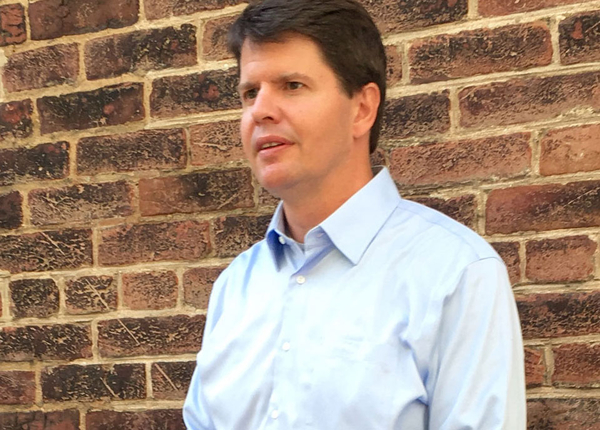Michael Trucano
“Distributing digital dividends"
Interview by Johanni Larjanko

© World Bank
Michael Trucano is Senior Education and Technology Specialist and Global Lead for Innovation in Education at the World Bank. He blogs at blogs.worldbank.org/edutech/
It's the middle of summer. I have travelled to a remote island in the Vaasa archipelago, in Finland. Basically I am in the middle of nowhere. I have an appointment. Michael Trucano of the World Bank has agreed to talk to me on future skills. I set up my computer and open Skype. In another part of the world, Mike answers from his office in Washington, D.C., where it is early morning. As the afternoon sun is shining on me and the waves are lapping at my feet, I conduct an interview with a man deeply engaged in digital equity.
What skills do you think we will need in the future?
Hmm, well, certainly we will need a bunch of them. It depends on who we are, where we are, what we need and what we want. Some of the skills that we've had in the past that have helped us not only navigate life, but which have helped us to find and keep employment, are certainly changing. A lot of routine work is going to be much less valued. In its place, I think skills such as critical thinking, communication and the ability to get on with, manage and work with all kinds of people are the sorts of non-cognitive skills and competencies that will be increasingly important. I wouldn't call them 'new' skills, exactly. There is a lot of worry about automation these days, and that the robots are coming or the algorithms are coming. These are the types of skills and competencies that don't lend themselves to being automated because they are fundamentally human, fundamental to who we are as people.
So the driving forces here are globalisation, technical developments and the sensation that the very nature of work and the type of work that is being done manually is shifting towards computer-assisted or technology assisted to an increasingly higher degree?
Yes, that is an assumption I would share. Technology is driving so much of our lives right now, whether we like it or not. It's been like that for centuries, but the speed and the pace of change now is, I think, especially disorienting for many people. It's unsettling.
Some consider digital a tool, a way of accomplishing something. Others would say that digital is a topic and a skill in itself. Something to understand, with deep and fundamental implications for society, and the planet.
I stand right in the middle of that line. I think it is both. That's one of the challenges about so much of this. At the recent Volkshochschultag in Berlin, the question of digital equity was raised. We discussed whether digitalisation improves equal access to education, promotes 'educational justice', or if it increases the unequal access to education even more. In that case as well, my answer is 'yes' to both sides. It's a complex world we live in, and the answers aren't simple.
“More and more people realise that it is certainly possible to leapfrog in the wrong direction as well, and also that certain groups may jump ahead much further than others."
There used to be a lot of talk about the leverage effect the Internet could bring to developing countries. What happened with that discussion?
I think it's a discussion that is still going on in some places. The metaphor of 'leapfrogging' is still heard, related to the use of new technologies. Usually it is about using information and communication technologies (ICT) in education to skip some steps in development. I think more and more people realise that it is certainly possible to leapfrog in the wrong di-rection as well, and also that certain groups may jump ahead much further than others. There is very little, or at least too little, debate in the world today around the resulting inequalities. But these are things that can change quickly, and it is perhaps worth noting that the winners, the big winners, can also fall from their perch as well.
This is something that I think should colour our discussion on equity, and I mean equity front and centre. In the education sector, 'equity' is really the big issue, together with the need to imbue students, citizens and the workers of tomorrow with sets of new skills. What I mean is: We need to use ICT in a way that at the very minimum offers equal opportunities. If we think about this, about inequality, from the start, I think it can help direct us in more useful ways in how we think about technology use in education. If we do not think about these things, we will have some real problems.
“Looking back, I do think many good things have happened over the years as a result of technology use in education, but we are definitely not there yet."
I have a feeling ICT has been a promise for a long time now. Something that will level the playingfield, improve our lives, democratise learning, etc., etc. But when will it ever fulfil these promises?
It's true. The 'revolution' has been long promised, the revolution that technology can bring about in education. Back in the 1920s, Thomas Edison talked about the potentially revolutionary value of the motion picture, and what that was going to do to transform education. His very words have since been repeated with some regularity and increasing frequency about the potential revolutionary value of television, radio, and computers; now it's about tablets. Looking back, I do think many good things have happened over the years as a result of technology use in education, but we are definitely not there yet.
Can you explain digital dividends to me?
Every year the World Bank puts out what we call our flagship analytical publication, the "World Development Report". This year it looked at the impact, and also in many cases the nonimpact, that technology has had on communities and societies around the world. Basically it says that the dividends that are to be accrued from the use of technology are being unequally distributed in profound ways. The report states that we have a choice. As policymakers, educators, citizens or parents, we can decide how we want to answer that challenge. If we decide not to answer that, this is also a choice. In the literacy community, they started talking almost three decades ago about a 'Matthew Effect' related to reading, the idea that the rich get richer, and the poor get poorer. We are seeing this in technology as well. Advantages accrue to those who are already advantaged. 'Digital Dividends' documents this, in the typical World Bank way. There are lots and lots of data, and graphs, and charts. The report may seem a bit heavy at times, but there is an advantage to having this amount of data behind the analysis. It is very thorough, and so makes a clear statement: We need to deal with this.
So we have a choice. We can despair, or we can act.
Yes. I don't want to deny that feeling of despair that some people have, but if we do not have a choice, who does? Technology is created by people, and there is a tremendous amount of exciting things happening, creating new opportunities. We can change the way education is offered, as well as other public services. More and more of these tools are also freely available, thanks to open source software and va rious social movements. These are opportunities, they will not change things by themselves.
At the same time the concept of what is knowledge, and what do you need to learn is being discussed. I would say that to manage well in the future you need to learn more about social skills, learning-to-learn, curiosity and selfreliance. Do you agree?
You know: I think I do! The facts today are only one Google search away. Many such things are routine, and thus lend themselves to automation, or outsourcing. In the past 40 years, education has done a decent job of teaching in this factsbased way, at least in the global North and West. They have helped people to become, and remain, middle class. Now it is different. In addition to teaching certain basic facts, and how to place these facts in their proper context, we need to teach non-cognitive skills, communication skills, skills deal ing with empathy, critical thinking and analytical skills. These will influence and shape society, and should be part of the curriculum.
So, the million-dollar question is, how can we teach these skills?
There is a lot of rhetoric today in some quarters about technology replacing teachers. Some say the access to information will somehow magically lead to a better informed and enlightened student population. A fundamental belief here at the World Bank is that investment in teachers, and in support for teachers, will yield the best results. We are talking about all kinds of teachers, in classrooms and outside. The student or the learner is at the centre, and the teacher is right there beside her.

“We need to teach non-cognitive skills, communication skills, skills dealing with empathy, critical thinking and analytical skills”, says Michel Trucano. © World Bank


